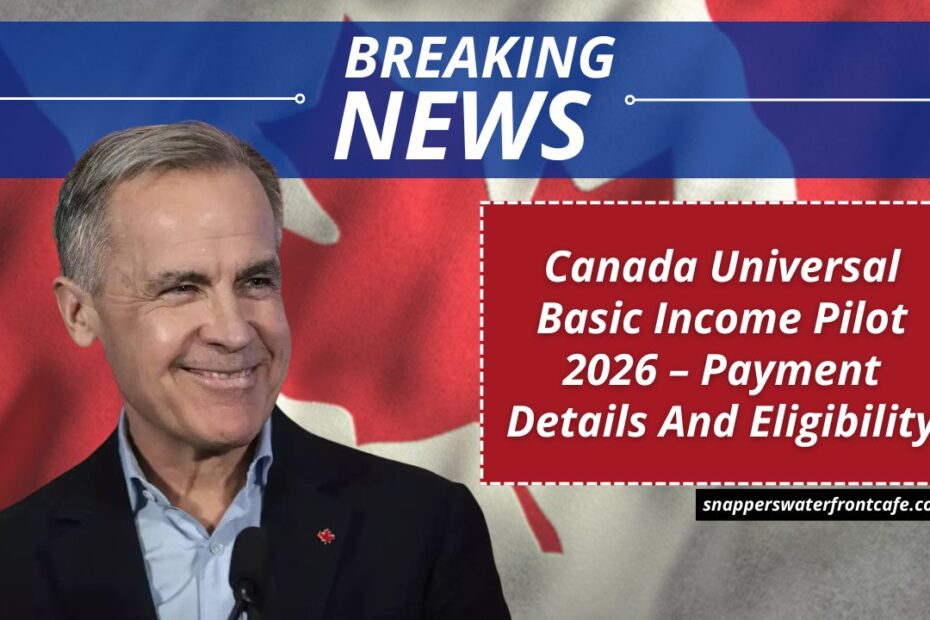In 2026, Canada is preparing to test one of its boldest social policies yet—the Canada Universal Basic Income (UBI) Pilot.
This large-scale trial will distribute fixed monthly payments to selected citizens in order to measure how guaranteed income influences financial stability, employment decisions, health outcomes, and overall quality of life.
Unlike previous short-lived experiments, this pilot will be broader, longer, and more comprehensive, potentially shaping the future of Canadian welfare policies.
Key Eligibility Rules for the UBI Canada 2026 Pilot
Eligibility for participation in the Canada Universal Basic Income Pilot will be based on several criteria to ensure fairness and diversity:
- Low and middle-income households will be prioritized.
- Adults aged 18 and above will qualify.
- Residents of specific provinces, with Ontario and British Columbia expected to be among the first participants.
- Canadians not already receiving comparable government benefits.
Additionally, the program aims to ensure representation from Indigenous groups, newcomers, persons with disabilities, and other diverse backgrounds.
The final rules will be confirmed once Parliament gives legislative approval, expected in early 2026.
Payment Structure and Duration of the Pilot
The most awaited detail of the program is the payment structure. Participants will receive monthly tax-free transfers, deposited directly into their bank accounts.
The exact amounts will depend on household size and income level.
- Single adults will receive about CAD $1,200 per month.
- Couples are expected to get CAD $2,000 monthly if their combined income is below $50,000.
- Families with children may receive CAD $1,800 to $2,400, depending on dependents.
The trial will run for 24 months (two years), with the possibility of extension if outcomes and political support remain strong.
Importantly, recipients will not be asked to quit their jobs—this study is designed to observe whether guaranteed income encourages work, entrepreneurship, or education, rather than discouraging it.
Payment Breakdown
| Household Type | Monthly UBI Payment | Taxable? | Conditions |
|---|---|---|---|
| Single Adult | CAD $1,200 | No | Income under $30,000/year |
| Couple | CAD $2,000 | No | Joint income under $50,000/year |
| Family with Children | CAD $1,800–$2,400 | No | Varies by dependents |
Why the Government Is Launching UBI in 2026
The Canadian government is introducing this program at a time when economic pressures, inflation, and automation are changing the job market rapidly.
With more workers relying on gig economy jobs and the cost of living increasing, policymakers see UBI as a potential solution to growing financial insecurity.
Main Goals of the Pilot
- Reduce Poverty – By ensuring every participant has a stable monthly income.
- Simplify Benefits – Instead of relying on dozens of overlapping support programs.
- Promote Economic Growth – Recipients may spend more locally, supporting small businesses.
- Enhance Well-being – Testing whether a steady income improves mental health, education, and family life.
However, critics argue that such a program may be too costly in the long run and could discourage some people from working.
The pilot will gather real-world data to confirm or challenge these arguments.
What Makes the 2026 Pilot Unique?
The Canada Universal Basic Income Pilot 2026 stands apart from previous attempts, such as the Ontario trial in 2017, which was unexpectedly cancelled. The new program differs in several ways:
- Bipartisan Support – Unlike earlier efforts, this pilot has backing across party lines, making it less likely to be cut short.
- National Scope – While focused on select provinces, the project is designed as a model that could later expand nationwide.
- Advanced Data Collection – Participants will give permission for their financial, health, and employment data to be analyzed. This will provide a 360-degree view of how UBI impacts different aspects of life.
- Longer Duration – Running for two years ensures more reliable results compared to short-term trials.
This broader, more transparent approach is expected to deliver the most comprehensive UBI data ever collected in Canada.
The Canada Universal Basic Income Pilot 2026 represents a groundbreaking moment in the nation’s history.
By testing whether guaranteed income can reduce poverty, encourage entrepreneurship, and improve living standards, this program could reshape the future of Canadian social policies.
While questions remain about long-term costs and political feasibility, the insights gained from this pilot will be invaluable.
Canadians across the country will be watching closely as the results unfold, knowing that this trial could set the stage for a permanent nationwide basic income program in the years ahead.
Frequently Asked Questions
Who will receive payments in the UBI 2026 pilot?
Adults aged 18 and over living in participating provinces, with income below defined thresholds, will be eligible to receive monthly UBI payments.
Will UBI payments replace other benefits?
No. The UBI Canada 2026 payments are meant to complement existing programs, not replace them. However, overlap rules may prevent duplication of benefits.
Can participants work while receiving UBI?
Yes. Participants are free to continue working, studying, or starting businesses while still collecting their monthly UBI payments.
The trial is specifically designed to track how guaranteed income influences work and lifestyle decisions.

i really like this UBO program it will help a loots of people as im living on disability its hard not having enough money